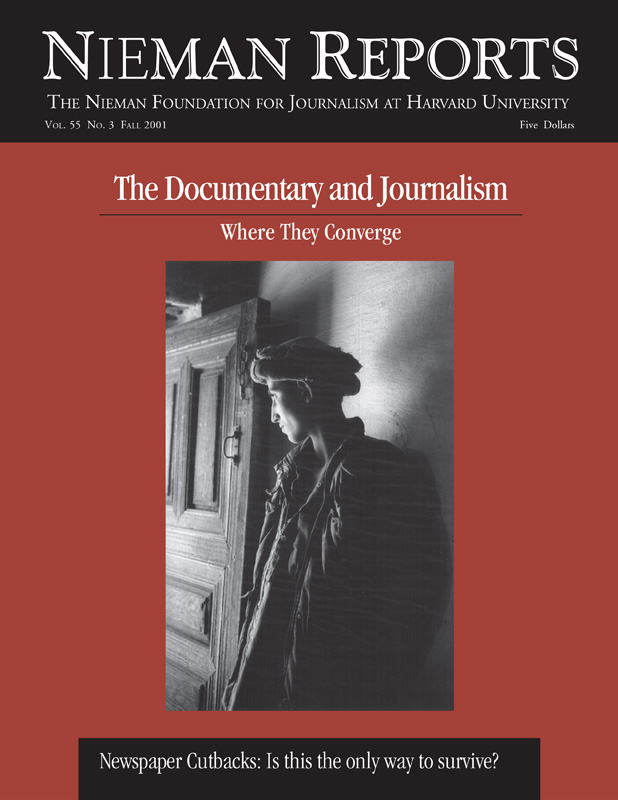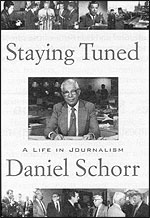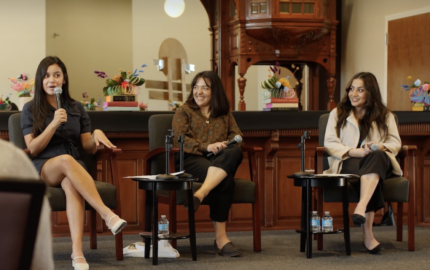

Staying Tuned: A Life in Journalism
Daniel Schorr
Pocket Books. 345 Pages. $26.95.
Among the ever critical editors and reporters who work for newspapers, Daniel Schorr may well be the most admired broadcast journalist of our time. In a reporting career stretching back to the 1940’s, he has been a staunch defender of the First Amendment, a tireless searcher for the truth in both domestic and foreign affairs, and a brilliant analyst of the increasing complexities confronting a domestic society, the latter a role he continues through National Public Radio.
A reader of his memoir, “Staying Tuned: A Life in Journalism,” might wonder how his career would have differed had he found his first major job on The New York Times rather than with CBS News. He writes that he wanted most of all to be a foreign correspondent for the Times, which repeatedly turned him down. At one point he was told that after lengthy consultations with the newspaper Turner Catledge, then the executive editor, had ordered a freeze on hiring additional Jews on the foreign staff for fear it might hamper the paper’s coverage of any mid-East war. The ban was soon canceled, and Schorr was the only person affected by it.
On other occasions, any number of reasons for his rejection might have been at play on a paper, then and now, constantly besieged by job seekers. Certainly it was not lack of talent. Having later worked for the Times, I believe that had Schorr gone on the staff he would most certainly have been an outstanding correspondent and would eventually made a top editor or columnist. But he would not be recognized as a celebrity by leaders and others around the world and, of course, he would have had less material wealth. On the other hand, he would not have had to undergo the excruciating treatment he received from television executives and owners. After establishing a distinguished record at CBS News, he was fired for passing a secret CIA report to The Village Voice after the network refused to let him broadcast it.
The falling out, however, went much deeper than that. CBS executives were displeased that some of his reporting offended government officials who duly complained to the network’s headquarters. Schorr took that in stride, acknowledging that because broadcasters are government regulated they do not have the freedom that newspapers enjoy. Some of his difficulties, however, stemmed from standard network practices. Reporters, given two minutes to explain a complicated development, were encouraged to end the segment with a statement of what it means. Too frequently the reporter would state the facts, briefly, then sign off with a one-sentence editorial.
In reporting Nixon’s statement to a publisher’s convention in 1974 that “your president is not a crook,” Schorr concluded in his broadcast, “The evidence indicates otherwise.” No print reporter could get away with that. He or she would be expected to write what the evidence was and let the reader decide. But not TV.
This and other broadcasts by the network caused CBS Chairman William Paley to order the abolition of “instant analysis” of Nixon appearances, but his order would have no effect on overall TV news practices. Schorr was too conscientious and prickly to thrive in that culture.
After leaving CBS at the age of 60, he coasted “on the momentum of fame” by lecturing, teaching at Berkeley, and writing a newspaper column. But none of these satisfied his appetite for reporting. So when Ted Turner, who was then in the process of creating an around-the-clock television news service, came to him with a job offer, he succumbed to the opportunity and was soon back on the television screen for Cable News Network (CNN).
If there was ever an odd couple it was Turner and Schorr. Yet Schorr prospered and renewed his fame for a few years. But when CNN tried to eliminate a clause from his contract that gave him the right to refuse an assignment, Schorr balked and CNN let him go. The network asked him to return the large satellite receiver dish that Turner had given him six years earlier, before cable service was available.
Schorr replied, “I would be glad to return the dish, but since it had been a personal gift from Turner, I would like a letter from him requesting it. Also I would expect CNN to pay for relandscaping after it was dug up. And, since the dish had attracted local newspaper attention when it was first installed, the removal probably would be noted by the media.”
A CNN manager called to say, “Keep the f— dish.” Schorr noted, “It still stands there, a memento.”
It is obvious throughout the book that Schorr has a very large ego, which he acknowledges. The book would have been improved had it been shortened by a third. Time after time Schorr relates the details of assignments he carried out around the globe that add little to his story. He is a consummate name-dropper. The index reads like a listing of people of prominence in the latter half of the 20th century.
But, unlike most self-absorbed celebrities, there is another side to him. He has a deep concern about social justice. Perhaps that was due to the influence of his wife, Lisbeth Bamberger Schorr. He was 50 years old when they were married. He had worked mostly abroad and she, a social scientist, was employed in Lyndon Johnson’s War on Poverty. He began to take on domestic assignments that had none of the glamour of the international arena he was accustomed to following. I observed him at the 1972 Republican National Convention covering the platform committee with a vengeance, an assignment most reporters shunned as irrelevant to the process of nominating a president.
Years later, President Clinton put his hand on Schorr’s shoulder and said, “Dan, marrying Li was the smartest thing you ever did.” Clinton had talked to her at length about a book she had written, “Within Our Reach: Breaking the Cycle of Disadvantage.”
Schorr dutifully reports this, but he stops short of saying—perhaps he does not know—that her book is considered a signal achievement among her peers that could have a more lasting legacy than anything her husband did. Toward the end of his book, Schorr observes that his view of his and his family’s accomplishments is shifting. “In the twilight of a life and a career, I find new enjoyment in the way my wife, my son, my daughter have distinguished themselves by serving the public weal,” he writes.
Schorr continues to make an impressive contribution with his reporting and analysis on NPR, which reaches an audience interested in advancing humane and lasting values. “In the old days,” Schorr concludes, “people would recognize me and say, ‘I’ve seen you on television.’ In recent years it is more likely to be someone who swivels around in a restaurant and says, ‘I would know that voice anywhere,’ and then something like ‘Thank you for explaining things.’ I find that most satisfying.”
John Herbers was for 24 years a reporter and editor at The New York Times and covered civil rights, urban affairs, congress, national politics, the White House, and demographic trends. He is a 1961 Nieman Fellow.


